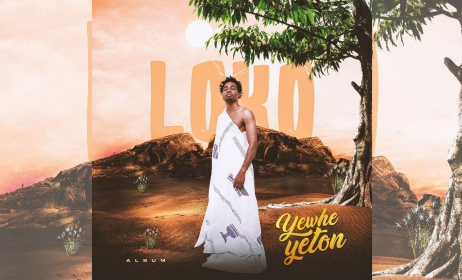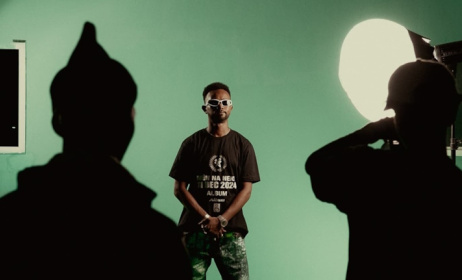Yoyo Tinz: the group documenting Ghana’s hip-hop scene
As a culture African hip-hop is constantly evolving. From Abidjan to Douala, hip hop and its related fields like rap, graffiti and DJing have only grown and are now clearly part of the continent’s identity.
 Yoyotinz Crew
Yoyotinz Crew
Ghana’s capital city Accra is on the right side of the African rap revolution happening on the planet. Within the city, a part of the people making things happen are the collective Yoyo Tinz (stylised as yoyo tinz.) The group has just launched a website and played a role in the release of th new album by the famous Ghanaian hip hop duo Fokn Boiz.
According to the collective, “Yoyo Tinz is a group of young, cosmopolitan and dynamic people who promote Ghanaian hip hop for anyone who wishes to know more about this rich and diverse culture.
“Through our website and social media platforms we encourage the culture, give artists visibility and critique the industry through talks and healthy debates. Yoyo Tinz aims to share all aspects of the diverse culture: graffiti, rap, dance, DJing, beatboxing, lifestyle and much more. We also produce original video content which includes interviews, documentaries, live session etc.”
Read the interview with the yoyo tinz collective below:
What does yoyo tinz mean and what motivated you to promote Ghanaian hip hop?
“Yo yo!” is a hip hop chant. We realised that there is no platform dedicated to the hip hop culture space. As lovers of this culture, it was difficult to find information on events, artists, etc. We want to fill this gap. Yoyo tinz is dedicated to archiving, documenting, and promoting the rich and diverse culture that is Ghanaian hip hop.
What are the activities of the collective?
Through our website, talks, healthy debates and social media platforms, we encourage the culture, give artists visibility and critique the industry. yoyo tinz aims to share all aspects of the diverse culture: graffiti, rap, dance, DJing, beatboxing, lifestyle etc. We also produce events and original video content which includes interviews, documentaries, live sessions, and much more.
How is the hip hop culture in Ghana?
There is definitely a scene but most people don’t necessarily think about it as a culture. The rap element is the most vibrant one. There is a major confusion between hiplife and hip hop. Hiplife is a term was that coined by Reggie Rockstone to define a new version of rap: when rappers would perform in local languages.
Over the years what hiplife truly means has become an endless conversation. It is difficult to distinguish between what is hiplife and what is not. Because of that, there are people who do not associate themselves with hip hop when there are actually hip hop artists like dancers, DJs, etc. Sometimes it is also because they don’t want to be confined in one genre and miss the few opportunities that exist. Being versatile gives you more chances to get opportunities to perform. But there are definitely hip hop DJs, graffiti artists, beatboxers, and b boys.
What is the difference between English-speaking Africa hip hop culture and that of Francophone Africa?
That is a good question. We do not know much about the francophone hip hop scene, but it is one of our objective to bridge that gap and understand each other. That is why we started translating all of our content to French. Also some of the team members are planning on doing French classes, we also wish to meet some of the key people in the hip hop field in Francophone countries such as Senegal, Togo, Burkina Faso and we are trying to collaborate with French speaking artists as often as possible.
What are the major events of the hip hop scene in Ghana?
There used to be Bless The Mic, a yearly festival which featured a lot of hip hop artists. And all the main artists before they became big used to pass through and perform on that platform. It is not that active anymore now, but there are concerts that feature hip hop artists, but once again it’s mainly focused on rap and DJing. There is also a Ghana hip hop month in March, but we don’t think it has gained proper grounds yet. Alliance Francaise recently started a hip hop week that showcases all the elements of hip hop and we think it might be principally Accra-based. So there are some initiatives but it is still in the developing phase. We hope that we all will be able to achieve our goals to create a major hip hop scene in the country.
What are the major artists of the Ghana scene?
Sarkodie, EL, Edem, M.anifest, Fokn Bois, Joey B, Pappy Kojo, Jayso for the rappers. DJ Black and Magnum for the DJs. Jerry One for dancers; he appears in a lot of music videos. For the beat makers: Jayso, DJ Juls, Magnum. We believe there are more and would need to research, but those are the names that come immediately. For the graffiti we are aware of Deff Art because he gets a lot of great deals, and worked with Adidas for example. There is also Moh, who gained popularity thanks to his works at Chale Wote festival. But we feel like graffiti is still unknown, but these are the guys we know.
Is African Francophone rap heard in Ghana?
Unfortunately, no, because of the language barrier. But in the team, some of us do, and we know few of our friends who listen to some French songs but in Ghana it is not a major thing as Francophone artists are not played on radio or on TV. Some of the French dance or pop songs make it to the radio so maybe there is still some hope that one day we will also have some Francophone artists playing.
Your platform has won first prize in Music Start-ups Competition Impact...
We didn’t expect to win, we even almost cancelled our participation because of logistic issues. When we heard the news, we were really excited and we did not believe it. That is a great opportunity that is given to us, and it gives us more motivation to continue the work.
What feedback have you received from people having had this price?
The event was attended by start-ups and cultural actors from the Francophone countries in West Africa, so we mainly received feedback from them and from the experts of the panel. Most of them encouraged us to be consistent, gave us ideas to make money and gave us names of other start-ups that could inspire us and contacts of people who do similar work, etc. We really felt like there was an interest for what we are doing. So we now need to work and have our content both in French and English and we wish to do more collaborations with artists from the neighbouring countries: Ivory Coast, Burkina Faso and Togo.
Now yoyo tinz is a website (yoyotinz.com). What did it right when visiting?
We are trying to have a website as complete as possible, where you can find information on the whole culture. So we have a section dedicated to the culture itself where you can find articles on the elements of hip hop. The next tab titled ‘dialogue’ is for interviews. Then there is ‘write ups’ for articles, ‘wossop’ for events, and things that are happening or about to happen.
We will try to announce all the hip hop related events under that tab, ‘gem’ is the knowledge room: this section of the website will provide visitors with valuable and relevant information about the culture and beyond that, share knowledge, spread awareness and give enlightenment.
Can we ever hope to see the birth of a festival yoyo tinz?
Oh yeah absolutely, that is a project we are working on and we are hoping that we would be able to put it up by end of 2017.
What are your short and long term ambitions for yoyo tinz and the Ghanaian hip hop?
Short term: Continue our webseries, post regularly on social media, and on the website. We just released the latest album of the very famous Ghanaian hip hop group Fokn Bois. Long term: yoyo tinz festival, having a TV channel, having an online radio.



























Commentaires
s'identifier or register to post comments